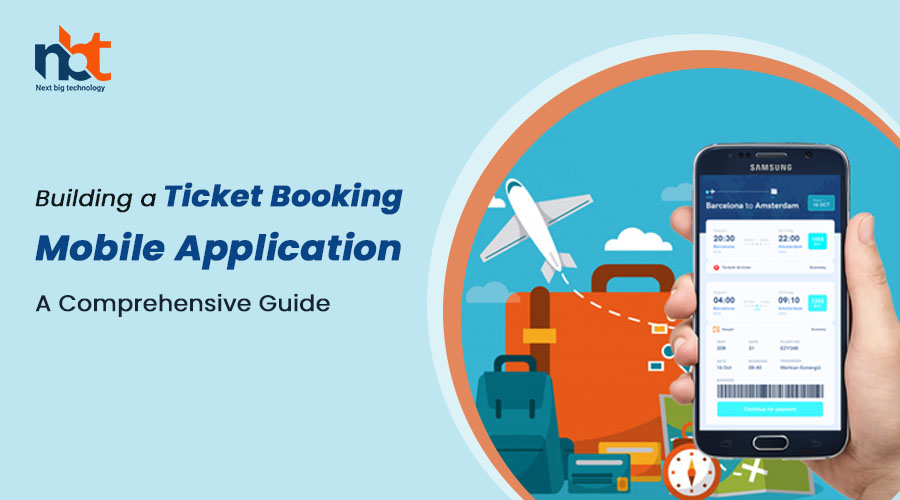Introduction:
Ticket booking mobile applications have revolutionized the way people book tickets for various events, including concerts, movies, sports matches, and travel. These apps provide users with a convenient platform to browse, select, and purchase tickets, eliminating the need for physical queues or manual booking processes. If you’re considering building a ticket booking mobile application, this comprehensive guide will walk you through the step-by-step process. From defining your app’s objectives to designing an intuitive user interface, integrating essential features, and ensuring a seamless ticket booking experience, we’ll cover everything you need to know to create a successful ticket booking mobile application. Let’s get started!
- Define Your App’s Objectives and Target Audience:
- Identify the types of tickets your app will offer (concerts, movies, sports, travel, etc.)
- Determine the target audience (age groups, interests, locations, etc.)
- Analyze the competition and find ways to differentiate your app
- Choose the Right Platform and Technology:
- Select the mobile app platform (iOS, Android, or both)
- Determine the programming languages and frameworks (Swift, Kotlin, React Native, Flutter, etc.)
- Consider the backend infrastructure and database options
- Design an Intuitive User Interface:
- Create wireframes and prototypes to visualize the app’s layout and user flow
- Design a visually appealing and user-friendly interface
- Focus on simplicity, clear navigation, and intuitive controls
- Implement User Registration and Authentication:
- Enable users to create accounts and log in securely
- Implement password encryption and data protection measures
- Allow users to save their preferences and payment information for future bookings
- Integrate Ticket Inventory and Availability Management:
- Develop a comprehensive ticket inventory management system
- Integrate with event organizers, cinemas, travel agencies, or ticketing platforms
- Ensure real-time updates on ticket availability, pricing, and seat selection
- Provide Seamless Ticket Booking Experience:
- Enable users to search and filter tickets based on location, date, category, or price range
- Implement multiple payment options (credit/debit cards, digital wallets, etc.)
- Provide a streamlined booking process with clear steps and progress indicators
- Implement Seat Selection and Interactive Venue Maps:
- Enable users to choose seats or sections from interactive venue maps
- Provide real-time seat availability updates
- Implement features to reserve adjacent seats for group bookings
- Incorporate Booking Confirmation and E-Tickets:
- Send booking confirmation to users via email or push notifications
- Provide e-tickets with QR codes for easy check-in or entry verification
- Implement offline access to e-tickets for situations with limited internet connectivity
- Implement Real-time Notifications and Reminders:
- Send notifications for upcoming events, ticket sales, or special offers
- Provide event reminders to users before the event date
- Allow users to customize notification preferences based on their interests
- Enable User Feedback and Ratings:
- Incorporate features for users to provide feedback on their ticket booking experience
- Implement a rating system for events, venues, or service quality
- Regularly review user feedback to improve the app’s functionality and user experience
- Ensure Data Security and Privacy:
- Implement secure data storage and transmission protocols
- Comply with data protection regulations (GDPR, CCPA, etc.)
- Communicate your privacy policy clearly and obtain user consent
- Conduct Thorough Testing and Quality Assurance:
- Test the app for functionality, usability, and performance
- Conduct rigorous testing on different devices, screen sizes, and operating systems
- Identify and fix any bugs or issues before launching the app
- Launch and Promote Your App:
- Prepare for app store submission and approval process
- Develop a marketing strategy to attract users and create brand awareness
- Leverage social media, content marketing, and partnerships with event organizers
Conclusion:
Building a ticket booking mobile application requires careful planning, thoughtful design, and efficient development. By defining your app’s objectives, choosing the right platform and technology, designing an intuitive user interface, implementing essential features like ticket inventory management, seat selection, and seamless booking experience, you can create a successful ticket booking mobile application. Remember to prioritize user experience, real-time updates, and data security. With a well-developed ticket booking app, you can provide users with a convenient and hassle-free way to book tickets, enhancing their overall event or travel experience and fostering customer loyalty.

















